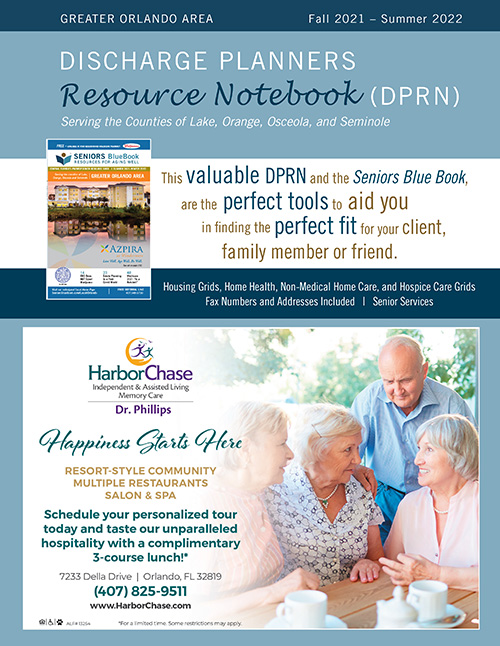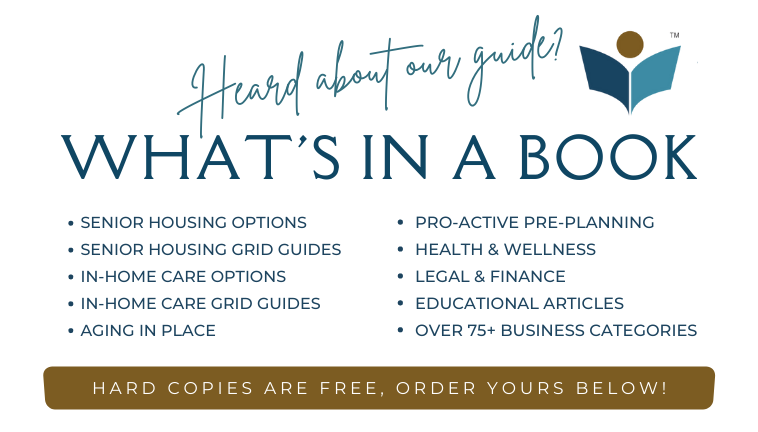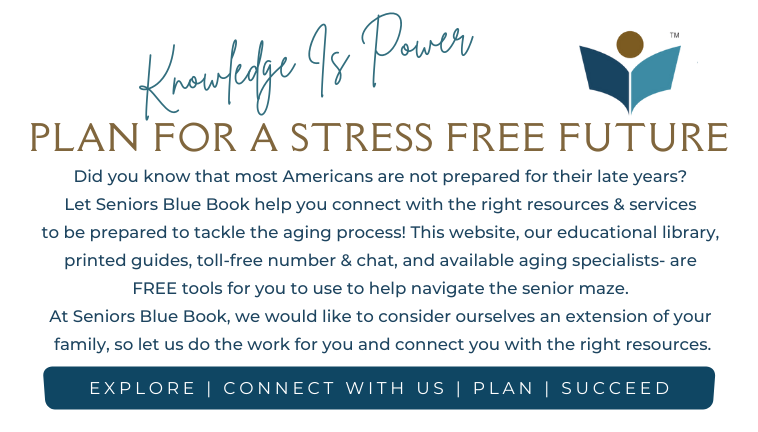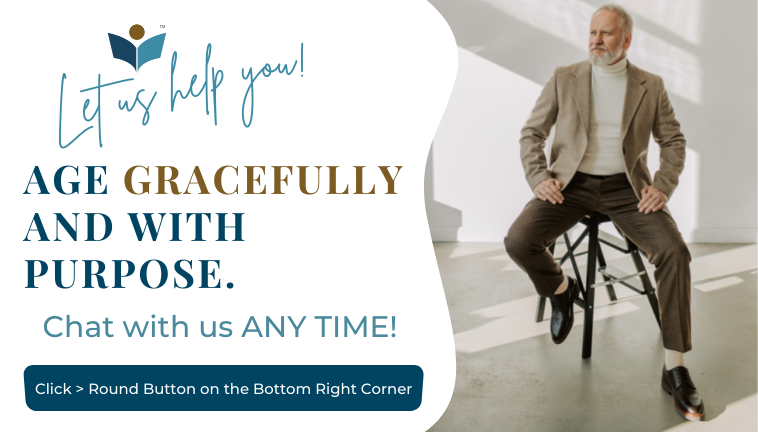Hi, my name is Lee Sapp, your local Publisher of Seniors Blue Book of Greater Orlando. For nearly 40 years, SBB has been the PREMIER SENIOR WEBSITE and PUBLICATION for all things Senior.
Whether you are a Senior, a Caregiver, or a senior care provider, you have found the right place. Looking for resources, looking to promote your business, or simply looking for senior activities. Seniors Blue Book website is your ‘go-to’ source for anything and everything related to Aging Well and Caring for your senior loved ones!
Seniors Blue Book’s print and web presence wide and diverse reach offer business opportunities that other marketing mediums are simply unable to provide. 120,000 copies are printed annually along with millions of website visits.
Contact us directly for any questions you may have. Enjoy!

Browse through the most recent copy of your local SBB!
Click to view
Browse through the most recent copy of your local DPRN!
Click to view



Enjoy delicious drinks, open bar, heavy hors d'oeuvres and desserts galore. Call 407-678-9363 to reserve your spot!
Learn ancient Qigong practice with modern day instructor Jasmine Win. Using the 5 elements of life, students will undergo an empowering & uplifting shift to take control of their health & lives.
Join Toni Gitles as she shares twenty-one common mistakes a caregiver makes as well as the solutions and strategies that may save your family time, energy, and heartache. officeonaging@ocfl.net To register 407-836-7446 To register
Create guided art while listening to classical music and letting it influence your art. Presented by Central Florida Community Arts, a continuum of arts education and experiences for a lifetime.
I am a licensed career agent with Unitedhealthcare.Ready for Medicare solutions and Retirement planning? I will be happy to sit down with you and explain your best options. My goal is to help people live healthier lives.
Welcome to our community ideally situated on the south side of downtown Orlando adjacent to quaint, historic neighborhoods. Our beautiful high-rise overlooking Lake Lucerne features spectacular views. Great arts and entertainment are right outside your door at the brand-new Dr. Phillips Performing Arts Center, Amway Center, Citrus Bowl and more. Our activities calendar is always jam-packed, and we provide a continuum of health care, if ever needed.
Learn More $4,400.00/month
TO US, YOU ARE MORE THAN A CLIENTAt the Family First Firm Medicaid & Elder Law Attorneys, well help support you and your loved ones with Medicaid, wills, trusts, advanced directives, Veterans benefits, probate, and more. Whether youre rejoicing in the birth of a child, planning for the future, or celebrating the life of a loved one, well be here by your side.
Rest assured that you will have just the right level of support and assistance when you need it. Thats the benefit of assisted living at Westminster Winter Park: The assurance of supportive care 24/7. Choose from a range of renovated apartments with spectacular views, all beautifully appointed with open layouts.Through Westminster Communities of Floridas Person-Centered Care philosophy, we offer a customized approach to providing support while maintaining dignity and individuality.We know that home extends beyond four walls its a sense of community. Residents enjoy access to a host of great campus amenities and health services, just one more benefit of assisted living in our active-living community.
Learn More $5,000.00/month
Even if you or a family member are excited to be moving to a senior living community or new home, there are bound to be a mix of emotions. Moving can be stressful and challenging even in the best of circumstances. To help you and family members navigate your next move, weve gathered a few of our favorite tips to make handling all the emotional ups and downs a bit easier. Get enough rest and dont skip meals In the hustle and bustle of planning a move, its important to take care of yourself. Getting sleep and making sure youre eating properly can help keep your energy up and manage your emotions. Work the way that works for you Some people are list makers. Others do better with a more unstructured plan. Take a minute to think how you best handle large projects and apply that to your move. Use the process that feels the most comfortable for your situation. Break up big tasks Looking at a huge move can be overwhelming. Instead, break your tasks into smaller ones. Dont try to tackle the entire kitchen in one long day; take it one drawer at a time. Youll be less likely to get overwhelmed. Let your feelings flow Bottling up your emotions may backfire in the long run. If you need to have a good cry or get irritated, its perfectly normal. Let yourself feel the way you feel and then you can move on to the next day or task. Ask for help No one has to move alone. Reaching out to family, friends and professionals like the team at WayForth for help organizing, packing and cleaning can relieve some of the feelings of stress and worry.
Read MoreThe Real Upside to Downsizing.When it comes to moving, we are all looking for ways to maximize the process while reducing our stress, responsibilities, errands, and belongings. The definition of downsizing is reduction.We have all been there in one capacity or another collecting too many items in our home. From your closet to the kitchen junk drawer, maybe your spare room, or garage - it can happen anywhere. When you are moving, cleaning out these areas on your own can be a challenge.There are solutions and resources to help with downsizing. Hiring a professional move management team trained to help make the right downsizing decisions is a start. Some experts say the process of minimizing excess in your home can feel liberating. How you move matters so these 6 downsizing surprises will hopefully inspire you to start the journey.Here are 6 surprising benefits to downsizing:1. Honoring your decisions means honoring you and your desire for a happier life.2. Once you get started you wont want to stop. Before you know it, you will be done.3. Saying yes to donating is rewarding. Donating is all about helping others.4. Your feelings will guide you toward success. Keep what you love, pass on the rest.5. Reliving stories is a wonderful and necessary part of the process.6. Your children will thank you. Maybe not now but they will definitely thank you later.Article Submitted by Patti Nanney with WayForth | WayForth Senior Moving Services
Read MoreIf someone you love has been hospitalized for a stroke, there are frequently many questions about the stroke recovery process and the transition back to the home environment. Knowing what to expect in the days, weeks and months following a stroke is important.At American, Advocate and Whitsyms In-Home Care, we understand that while the prospect of bringing a loved one home following a stroke may be a huge relief, there are many logistical issues that need to be addressed to ensure safety and adherence to a stroke recovery plan.Day 1Two of the first steps toward recovery are determining the type of stroke and the severity of the stroke. With this information, the medical team can work together to determine the best course of action to aid in recovery. The team typically consists of physicians, neurologists, and occupational, speech, and physical therapists who work to develop a rehabilitation plan. Therapy often begins while the individual is still in the hospital.Initial Weeks Following a StrokeLong-term effects of a stroke will vary from person to person based upon the severity and the part of the brain affected. Its common for those recovering from a stroke to experience:Physical symptoms weakness, paralysis, difficulty swallowingCognitive symptoms memory problems and trouble speakingEmotional symptoms depression, anxiety and impulsivityExtreme fatigue and trouble sleepingTo aid individuals in their recovery process, the healthcare team will recommend therapy to help patients make strides toward rehabilitation. This may include:Physical therapy helps the stroke patient relearn motor activities such as walking, standing, sitting, lying down.Occupational therapy helps the stroke patient relearn activities such as drinking and swallowing, dressing, bathing, cooking, eating, writing, using the bathroom.Speech therapy helps the stroke patient relearn language and speaking skills.Therapy sessions are customized to each individuals goals and needs and can often be conducted in the home.Post Stroke: 1 3 MonthsThe initial weeks and months following a stroke are important. The goal of rehabilitation is to restore as much function as possible to pre-stroke levels. While the healthcare team monitors the patient and therapy continues, its important to anticipate setbacks during this time. The setbacks can be physically, emotionally and mentally challenging for both the patient and his/her family. Work with the healthcare team to make adjustments as needed to the rehabilitation plan and prioritize mental health.Post Stroke: 6 Months and BeyondAfter six months, continued recovery is possible, but improvements will be slower. Some patients may experience complete recovery and others may have ongoing impairments. During this time, its important to remain in contact with your healthcare team:Primary care physician. The primary care physician can manage any health concerns beyond the stroke and can recommend lifestyle changes that can help prevent future strokes.Neurologist. With a deep understanding of the mechanisms behind stroke-related brain injury, a neurologist can recommend customized treatments to target the affected area of the brain.Rehabilitation psychologist. A psychologist will provide support with emotional, cognitive and behavioral functioning.Occupational, physical and speech therapists. OT, PT, and ST will aid in the ongoing recovery of functioning in order to complete day-to-day activities.A coordinated effort between the members of your healthcare team can help bring about further progress and recovery in the months and years following a stroke.Post Stroke: How Home Care Can HelpTo help aid in the recovery process, the referred care providers at American, Advocate and Whitsyms In-Home Care are here to help with a variety of care needs. During the initial hospitalization following a stroke, a knowledgeable referred care provider can help assess the home for fall risks and recommend other safety enhancements that will make for an easier transition home.Once home, a referred care provider can also assist with:Bathing, dressing and personal hygienePlanning and preparing nourishing meals and snacks, with adherence to any dietary restrictionsLight housekeeping and laundryFriendly companionship and conversationEncouragement to complete physical, occupational or speech therapy exercises / activitiesTransportation to follow-up medical or therapy appointmentsMedication remindersRespite for family caregivers to prioritize self-careAnd much more!For additional information about how a referred Florida senior care expert can help you or someone you love transition home safely following a stroke, contact us today. We have offices throughout Florida and we look forward to helping you.American In-Home Care Serving North, Central, and West Coast of FloridaAdvocate In-Home Care Serving Southeast and Southwest FloridaWhitsyms In-Home Care Serving Southeast and Southwest Florida
Read MoreMaybe it is due to the stereotype of a trust fund baby. Or itcould be the way trusts are depicted on television and film. Regardless, thereis a general misconception that if you arent extremely wealthy, you do notneed to create a trust. That simply isnt the case. Trusts are for anyonewho has assets. With that in mind, trusts are indeed for the wealthy, butthey are for you too. Once you learn and accept that you can benefit from trusts, youmay discover how valuable they can be for you if you have minor children orhave assets worth more than $500,000. Before we go on, we need to address thatlast point. On the one hand, we are stating that you dont need to beultra-wealthy to have a trust, but we also just said that you should considerone if you have more than $500,000 in assets. Though that amount may seem high,it may not be when you factor in your: Home Retirement Accounts Life Insurance PoliciesBank AccountsWhy are we recommending trusts for people facing thesecircumstances? It saves a significant amount of money that would otherwise bespent during the probate process. Generally, probate may cost about 3% of thegross value of what you have. If you have a $500,000 estate, that equates to$15,000. And again, trusts do not pass-through probate. When you fund a trustwith your assets, you no longer own them. The trust does. Your attorney canstill ensure you can access and use these assets (e.g., your home). Another significant advantage of a trust is that it prevents yourassets from being locked down in probate. If the probate process takes ayearwhich isnt abnormalyour children would have access to the money you leftthem until the probate process ends. Some people may want their children tohave access to the assets and funds you left them immediately. Their childrenmay even be reliant on the money or home you leave behind. Family First FirmShould you avoid probate?The answer to that question depends on your circumstances. When you meet withthe estate planning attorneys at the Family First Firm, we will take the timeto understand what assets you have and where you want them to go. Then we willsuggest the plan that fits your needs.Call us at:1-833-FL-SENIOR or email us at Intake@FamilyFirstFirm.com to schedule your FREE consultation today!
Read MoreThe cost of senior living in Florida may be more affordable than you expect. Our expert senior advisors will teach you insider secrets and strategies to pay for senior living and live the stress-free life you've been dreaming of. In this video, we discuss another way to pay for senior living: Veterans Benefits. For more ways to pay for assisted living, watch the rest of our series and download our FREE e-book "8 Ways to Pay for Assisted Living & Memory Care" - https://bit.ly/8WaysToPay If you're looking for senior living options or in-home care, contact us! We help seniors get the care they deserve to start enjoying their golden years. Call us: (800) 969-7176 Email us: info@floridaseniorconsulting.com Website: https://floridaseniorconsulting.com/
Download our FREE e-book "8 Ways to Pay for Assisted Living & Memory Care" - https://bit.ly/8WaysToPay The cost of senior living in Florida may be more affordable than you expect. Our expert senior advisors will teach you insider secrets and strategies to pay for senior living and live the stress-free life you've been dreaming of. In this video, we discuss another way to pay for senior living: long-term care insurance. For more ways to pay for assisted living, watch the rest of our series: https://www.youtube.com/playlist?list... AND Download our FREE e-book "8 Ways to Pay for Assisted Living & Memory Care" - https://bit.ly/8WaysToPay -------------------------------------------- If you're looking for senior living options or in-home care, contact us! We help seniors get the care they deserve to start enjoying their golden years. Call us: (800) 969-7176 Email us: info@floridaseniorconsulting.com Website: https://floridaseniorconsulting.com/
The cost of senior living in Florida may be more affordable than you expect. Our expert senior advisors will teach you insider secrets and strategies to pay for senior living and live the stress-free life you've been dreaming of. In this video, we discuss another way to pay for senior living: pensions. For more ways to pay for assisted living, watch the rest of our series and download our FREE e-book "8 Ways to Pay for Assisted Living & Memory Care" - https://bit.ly/8WaysToPay If you're looking for senior living options or in-home care, contact us! We help seniors get the care they deserve to start enjoying their golden years. Call us: (800) 969-7176 Email us: info@floridaseniorconsulting.com Website: https://floridaseniorconsulting.com/
The cost of senior living in Florida may be more affordable than you expect. Our expert senior advisors will teach you insider secrets and strategies to pay for senior living and live the stress-free life you've been dreaming of. In this video, we discuss another way to pay for senior living: Medicare and Medicaid. For more ways to pay for assisted living, watch the rest of our series and download our FREE e-book "8 Ways to Pay for Assisted Living & Memory Care" - https://bit.ly/8WaysToPay If you're looking for senior living options or in-home care, contact us! We help seniors get the care they deserve to start enjoying their golden years. Call us: (800) 969-7176 Email us: info@floridaseniorconsulting.com Website: https://floridaseniorconsulting.com/